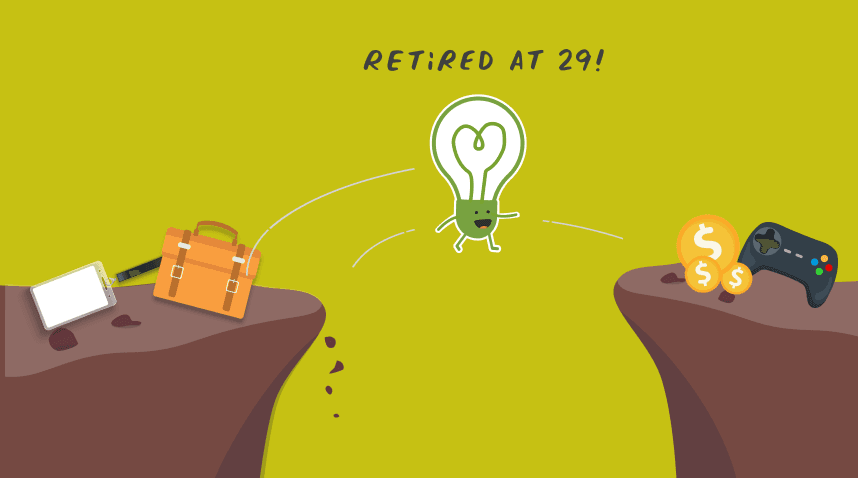Editor: In Singapore & Malaysia, there is a growing FIRE (Financial Independence, Retire Early) movement amongst Gen-Zs and Millennials. Author ‘S’, shares his experience in achieving FIRE at a young age. With the freedom to do anything you want and not work for the rest of your life, what else could you ask for! We tend to talk about FIRE, but what’s after that? S dives deeper.
TL;DR: It took lots of rollercoaster rides with money for me to find my true passion, which led to a broader question: what’s the meaning of life?
My obsession with money started young.

I was 18 when I told someone my goal was to make a hundred million dollars by 35. It seemed like an absurd, unreachable goal for someone who didn’t come from a wealthy family. But deep down, I believed I could do it. In fact, I believed I could exceed it. I wanted to be a billionaire. I wanted so much money I wouldn’t even know what to do with it.
But why?
That has always been a question that bothered me whenever I wanted something badly. Why? What’s next? What’s next when I do become a billionaire? What’s the point?
I remember walking into a Louis Vuitton shop, admiring all the expensive shoes and bags, and fantasizing about all the things I would buy when I’m rich.
I would look at photos of sports cars and imagine myself in a Lamborghini. When having a Lamborghini doesn’t feel good enough, I would find even more exclusive cars to get.
But why?
I wanted to be admired. I’d get a kick when people envy me. But did that really make me happy?
When I shared my goals with my closest friends, I could feel them distancing. My friends didn’t want to know how much money I had, or how rich I would become. I could see them nodding their heads but the corner of their eyes would look odd – something I could never quite make out.
Then I realised, nobody cares.
Nobody cares how rich I will be. They only care about themselves.
In fact, if I’m richer than them, it makes them feel insecure. It pushes them away. My need for approval actually drove my closest friends away. Nobody admired me.
I stopped sharing and talking about money with my friends.
Alright, so if money wasn’t going to get me admiration, why do I need more money?
Maybe to be happy? Makes sense. Having all the money in the world would free me from having to work.
So I worked hard to make money.
When most people were thinking about grades, I was teaching tuition. I studied the richest people like Warren Buffett. I took up jobs like sales where the number of hours I worked didn’t determine how much money I made. I did well in sales.
I started businesses on the side to earn more money. I scrimped and saved. I spent countless hours reading all the books and watching all the videos I can find about investing.
Then, the time finally came. I had enough money to feel like I didn’t need to work anymore.
So I retired. At 29.

I won’t lie. It was great at the start. The feeling of being able to wake up any time I want, having an empty calendar, and having money to pursue my hobbies and passions.
But what were my passions? What was truly my passion?
I had spent so much time trying to make money that making money was my only passion. Investing was my passion. Thinking about money was my passion.
But now that I have money, what’s next?
I spent one year trying out so many hobbies. It feels great to wake up and just play computer games the whole day, but I soon realised I can’t do this forever. I tried knitting, sports, photography, travelling, and many others. But few turned into passions.
Some hobbies stuck, like exercising and hanging out with friends. But I wouldn’t call them passions.
Something was still missing. I wasn’t happy.

I realised that I have a strong need for intellectual stimulation, and I went back to a job that satisfied that urge. That job is now my passion. I wake up every day more excited about that job than I was when I was financially free.
I used to think that retiring meant having so much money I don’t have to work anymore.
But Naval Ravikant once said retiring means not sacrificing today for an imaginary tomorrow.
To me, not sacrificing today means not depriving myself of good food to save more money. Not missing out on gatherings to earn more money. Not making so much money, then wondering what’s the point of it all.
When I had enough money but didn’t have a true passion, I still felt like every day was a struggle. I was still sacrificing each day to find a better tomorrow where I feel intellectually engaged.
If I feel like I’m not sacrificing today, I’m retired. I don’t need a lot of money for that. I can be working, and I feel retired.
When I found my true passion, I finally stopped asking why.
I finally stopped asking what was next.
It led me to discover the meaning of life.
What’s yours?
Wise steps
The best thing about the meaning of life is that it’s a very personal journey. There’s no one meaning for everyone, else we’ll all be competing for that same meaning. That’s also why I didn’t share mine because it will be very different from yours.
Yours could be to maximise the money you make before you die. It could be to find the love of your life. It could very well be that life has no meaning for you, and you’re floating along life seeing what it brings.
There’s no right answer. There’s your answer.
There’re many self-help books with steps to follow. Do x, and you’ll get Y. Study hard, and you’ll get better grades. Start a successful business, and you’ll get rich.
But I found my answers when I looked internally.
Your meaning of life is there to be found.
You just have to want to know it badly enough.


